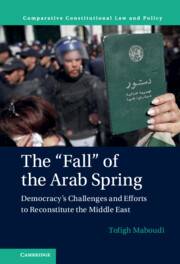Book contents
- The “Fall” of the Arab Spring
- Comparative Constitutional Law and Policy
- The “Fall” of the Arab Spring
- Copyright page
- Dedication
- Contents
- Figures
- Tables
- Acknowledgments
- Introduction
- 1 Constitutions, Civil Society, and Democratization in the Arab World
- 2 Democratizing the Parchments
- 3 Constitutional Negotiations and the Pathway to Democratic Transition
- 4 Pathways of Failure
- 5 Pathways of Failure
- 6 Pathways of Failure
- 7 Lessons from the “Fall” of the Arab Spring
- Bibliography
- Index
3 - Constitutional Negotiations and the Pathway to Democratic Transition
The Case of Tunisia
Published online by Cambridge University Press: 31 March 2022
- The “Fall” of the Arab Spring
- Comparative Constitutional Law and Policy
- The “Fall” of the Arab Spring
- Copyright page
- Dedication
- Contents
- Figures
- Tables
- Acknowledgments
- Introduction
- 1 Constitutions, Civil Society, and Democratization in the Arab World
- 2 Democratizing the Parchments
- 3 Constitutional Negotiations and the Pathway to Democratic Transition
- 4 Pathways of Failure
- 5 Pathways of Failure
- 6 Pathways of Failure
- 7 Lessons from the “Fall” of the Arab Spring
- Bibliography
- Index
Summary
Tunisia, where the Arab Spring uprising started, became the only country in the Middle East and North Africa to transition to democracy. This chapter explains why Tunisia’s pathway to democratization was successful by focusing on its constitutional reform process. First, the chapter shows that in order for new constitutions to facilitate democratic transitions, both participation and inclusion in the process are necessary. Using empirical evidence from a statistical content analysis of the public input and constitutional drafts, as well as interviews from Tunisia, Chapter 3 shows the inclusive and participatory process significantly improved the democratic quality of the Tunisian Constitution, yielding a successful transition to democracy. Next, this chapter explains the role of civil society in facilitating the constitutional consensus and the broader transition. Civil society organizations in Tunisia could play this decisive role by fulfilling three core functions. First, they acted as a third-party arbiter of constitutional and political disputes among different groups. Second, different civil society organizations acted as watchdogs, ensuring the integrity and transparency of the process. Third, they created a public sphere for constitutional debates by offering an inclusive venue for citizens to engage in the constitution-making process.
Keywords
- Type
- Chapter
- Information
- The 'Fall' of the Arab SpringDemocracy's Challenges and Efforts to Reconstitute the Middle East, pp. 75 - 112Publisher: Cambridge University PressPrint publication year: 2022



